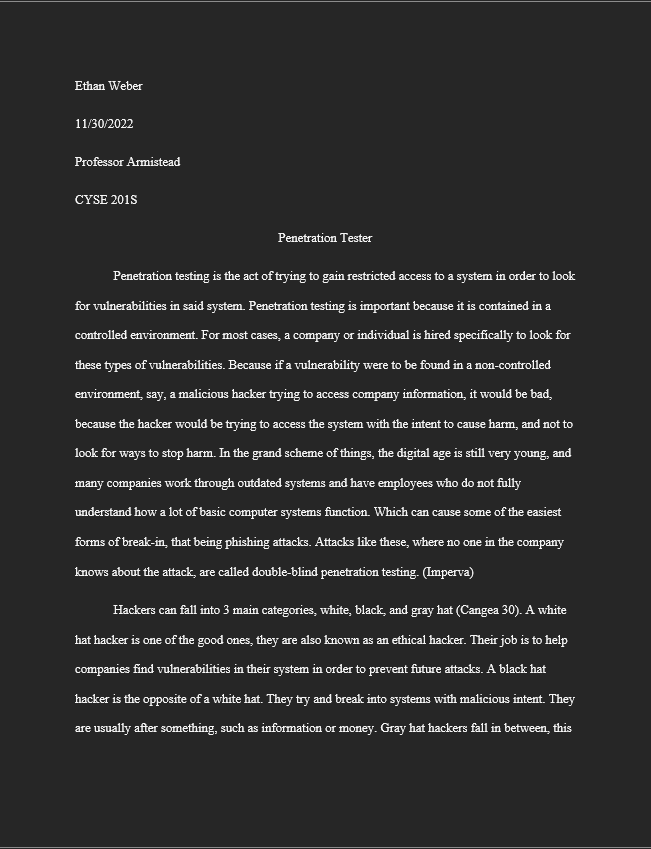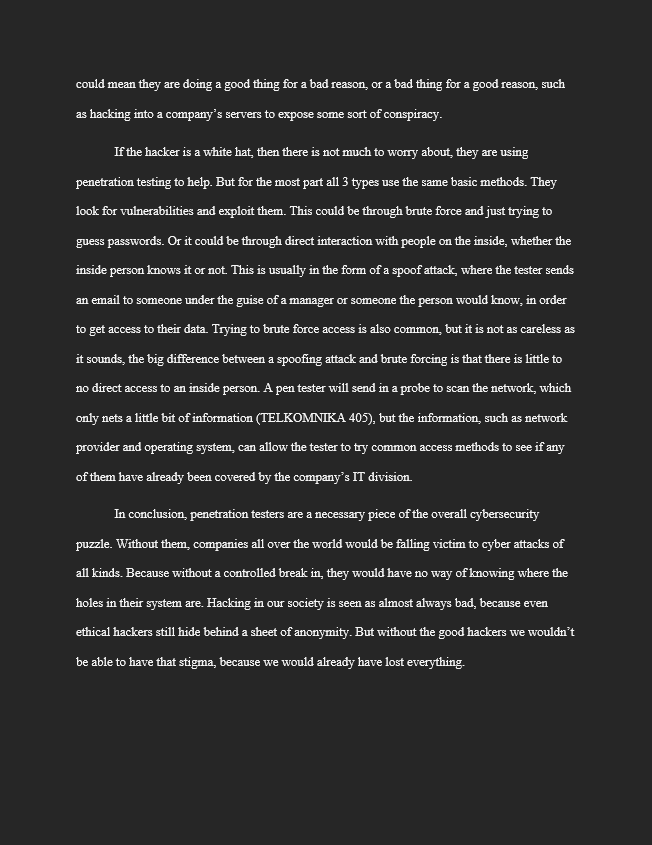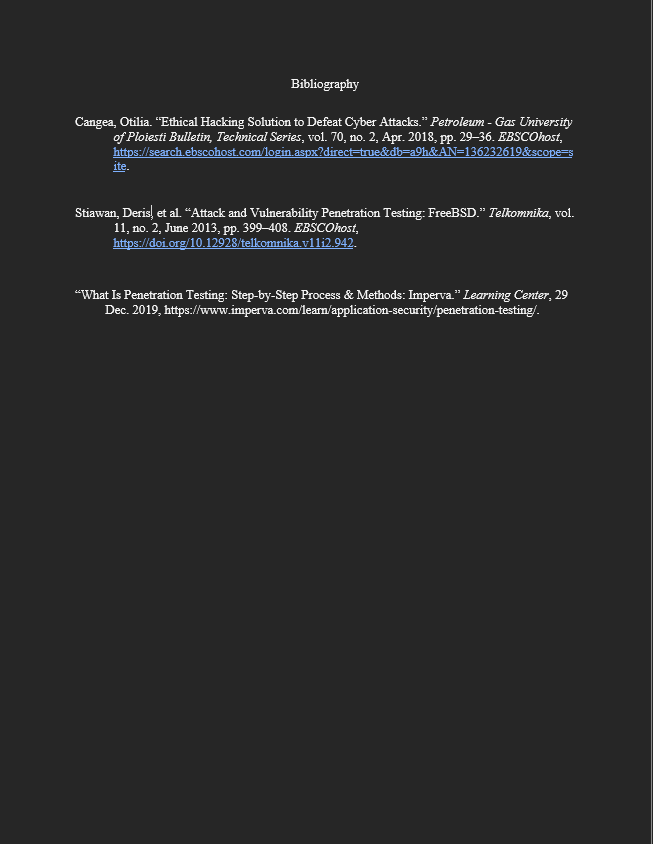




NICE Framework
I think that I would want to go into Data Investigation, I believe that I have a good sense when it comes to making connections of things. In my life puzzles and riddles have always fascinated me and I have been able to mentally put the pieces together and I think I could do that more in a job like this.
Principles of Science in Cybersecurity
The principles of science relate to cybersecurity as it helps people question how the factors hackers and companies affect the average consumer. It helps us understand the whys and hows of outside variables. Like why do hackers actually commit cybercrime, or what do we do in reaction to the realization that many of the large corporations nowadays have detailed digital profiles on us. But there are also things on the more micro side of all of this. There are questions we have that cover more peer to peer actions too. If someone actively gives another person their password, can you realistically get mad at the person you gave your password to if the person does something malicious with it. So if we can use these examples to explore these aspects, it can shed light onto why people do this and help the people affected get affected less.
Data Breaches
Researchers can use the public information abut data breaches to see what has already been breached and how they can work to stop it from happening further. Using the information they can fix the back doors that were used before but they can also use the information to try and predict what the next back door will be, people such as penetration testers and ethical hackers would be helpful in this case as they could test the information databases before the site goes public, which can help prevent any early breaches.
Maslow Hierarchy of Needs
Starting from the top with self fulfilling needs, when I was in high school I was the first person in my school’s history to get the Microsoft Office Master Certification, I worked really hard on it and when I finally got it I was very happy with myself. For esteem needs I do not really have a wide scale example for it, I can tie it in with belongingness and love though, some of my closest friends are my internet friends, friends I met through gaming and have stuck with for many years, we all really raise each other up and we can show each other cool things and not be belittled for it. For safety all I can think of is how I got my previous laptop riddled with viruses, I got it when I was not a tech savvy as I am now so I made so crappy decisions that got my laptop messed up. For necessary needs I can not think of much, computers can help get deals and discounts on necessities such as food, drink and other things.
Article Analysis 1
The topic of voting has been a hot topic of debate in the past six year, no matter what side of the aisle you sit on, your party of choice will have something to say about it. But a major aspect of the conversation is the medium that the voting itself is done through. In the past few decades voting has been pretty standard in the world, you go to a set location, you show form of identification, and you cast your ballet, be it through hard paper or a terminal made specifically for voting. An idea that has been passed around is the idea of online voting. I read the article, “Going from bad to worse: from Internet voting to blockchain voting.” It lays out the proposed positives of online and blockchain voting, while also highlighting the many flaws that can arise by switching completely over to it. The idea behind online voting is to create ease of access and in turn, increase voter turnout, voting is seen as a civic duty, something that people are obligated to do because they have been given a choice in their countries’ democracy or legislative system. Even though we live in the most technologically advanced age we have ever been, and we are at in the most technologically safe place we have ever been, but even though we are at that point, we still have a long way to go before we can trust the people of the world to be able to go online in the comfort of their own home, or at work, and make an incredibly important decision, and to trust that no one with more of a hand for technology to not try and tamper with the voting system. This article is very well made, in most arguments of this topic it quickly boils down to a debate of left and right, instead of focusing on the matter at hand, which is if online voting is truly a viable form of voting. And I agree with the article, since, as of right now, online voting is not a viable way to let people vote. I believe that for the time being voting must be a heavily proctored and watched over events, as it is very important to democratic societies. I would highly recommend this article to people who want to learn more about the conversation of online voting, as the way it lays out the subject in a very middle of the road way, helps make it easier for people who stick closely to their beliefs but want to know how the other side thinks. We sadly live in a world where there are people who want to cause harm to others. So we need to work to ensure that the process of important decisions are protected and can not be compromised by those who wish to cause harm. But that does not mean we cannot innovate on the processes we have in place. The voting process as it is not is not perfect, there most likely will never be a perfect system. But until the general public can be trusted with these decisions in a confined space such as their own home, we must keep with what we have, paper ballets, and dedicated voting terminals are the best we have right now. There will be a day where online and blockchain voting will be the standard. And in order for that day to arrive, one of two things must happen, we create the most impenetrable and perfect online voting system ever, or we can trust the general public to vote without the risk of anyone messing with anything, and I doubt either of those will happen anytime soon.
Article Link: https://academic.oup.com/cybersecurity/article/7/1/tyaa025/6137886?searchresult=1
Motives for Hacking
7. Boredom: Come on dude, there is so much more to do in life that can cure boredom than to hack and scam people.
6. Revenge: There is this cool thing called, getting over it, it is really easy and you do not need to ruin yours and someone else’s life just because they made you mad.
5. Entertainment: While I can agree that messing with people can be funny, there is such thing as going too far, especially with criminal activities.
4. Political: Politics drives our world, like it or not, and it can get people spun up really quickly, so going far when it comes to politics can be understood to an extent.
3. Recognition: I can understand why someone would want recognition, but also I don’t, why would you commit a crime and then want a big neon arrow pointing right at you.
2. Money: Just like how politics drives our world, money drives people, and being able to get a lot of money for what is likely easy for the person getting the money, it makes sense.
1: Multiple Reasons: What is most likely the reason for everyone to do stuff like this is a culmination of many reasons building up to a snapping point which causes them to act.
3 Real and 3 Fake Websites
We could do that, yes, but I do not think that would be best for helping people spot fake sites. If you put 6 websites in front of someone and tell them that 3 of them are fake, they are going to gain the ability to spot more details that could give them an answer. Like if you give them a fake website, and tell them it has the chance to be fake, they are going to be able to spot more irregularities, such as grammar mistakes and shady links.
Cybersecurity Meme

Social Media Disorder Scale

Article Analysis 2
Over the course of the 21st century, technology and the usage of the internet has become even more common throughout the world. What started as an easier way to send information to and from each other, has blossomed into something that people 20 years ago could not even imagine. But, with the growth and popularity of the internet, has also come downsides, specifically internet trolling and cyberbullying. In the article, Cyberbullying: Its Social and Psychological Harms Among Schoolers, they look to find what exactly happens to a youth’s mind when they deal with cyberbullying. The study groups ranged in age from 12 to 21. The findings showed that almost every study group experienced the same things, the ones who were cyberbullied were more likely to feel things like depression, and self esteem issues, while perpetrators were more likely to feel gratification along with hits to their self esteem as well. I think that this is a great article, so many people use cyberbullying as an example for the types of bullying, but it is almost never focused on, save for a few educational videos they show you in middle school. But they never delve into the effects that cyberbullying can have on a person. Early in the article they have a table that very clearly sums up the effects that cyberbullying victims felt after they experienced it, things like “Depression (+)”, quickly and concisely tells the reader that this group of people felt a rise in depression after experiencing cyberbullying. The article continues on by explaining that the best way to mitigate the risk of trauma and social harm is to have a strong adult presence in your life, things like supportive parents and teachers. I think that this finding is very strong. We always were told that if we experience cyberbullying, that we should tell our parents or a teacher, but youths, especially teenagers, are scared of the adults looking further into their online activities. Which risks them being caught with things like porn, or explicit messages between peers. This fear is extremely prevalent in the Gen Z generation, where the chances of our parents being more technologically literate are higher than generations like Millennials or Gen X. I have hope that findings like this will help younger people see that for the most part, adults want to help, so many of them know how to respect privacy and have no intention of exposing less than satisfactory internet behavior. And even if they did find out, whatever punishment that is given is so much better than suffering alone in silence. Overall, this article was fantastic, it sheds a scientific light on a subject that sadly has not been focused on as much as it should be. With simple to understand figures and tables, this article paints a strong picture of the who is being bullied, what effects it has on them, and how we can fix it, or at the very least prevent it from happening any further. I would recommend this to parents, but I would more so recommend it to teachers and other school faculty, as it much more closely pertains to them.
Article: https://vc.bridgew.edu/cgi/viewcontent.cgi?article=1089&context=ijcic
Social Cybersecurity: An Emerging National Security Requirement Response
The public internet is not a privatized system, it can be accessed by almost anyone in the world. So our priorities for how we handle cybersecurity have gotten much bigger and we need to be able to protect all of our people, but that is difficult as the size of the internet outweighs the amount of people we have to manage it.
5 Most Serious Unknown Cybercrimes
I believe that the most serious on on the list is collecting information about children, I personally hold the philosophy that anyone who preys on children should be killed immediately. Next I think exposing someone’s personal information online without their consent, there are some crazy people in the world and that can be a major danger to them. Third, I believe that searching illegal things on the internet is bad, for the most part, it is usually harmless but there can still be dangerous people looking for dangerous information. Fourth, I think bullying and trolling, since these things can lead to dire consequences like suicide. And fifth are all the things that include pirating media, as yes, if you pirate media from small time creators, that is pretty scummy, but giant corporations are not gonna miss a few bucks.
Career Paper


